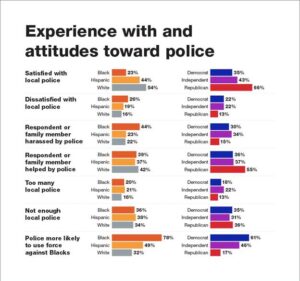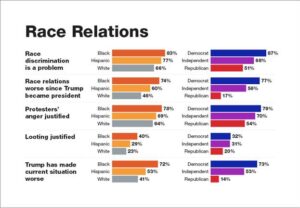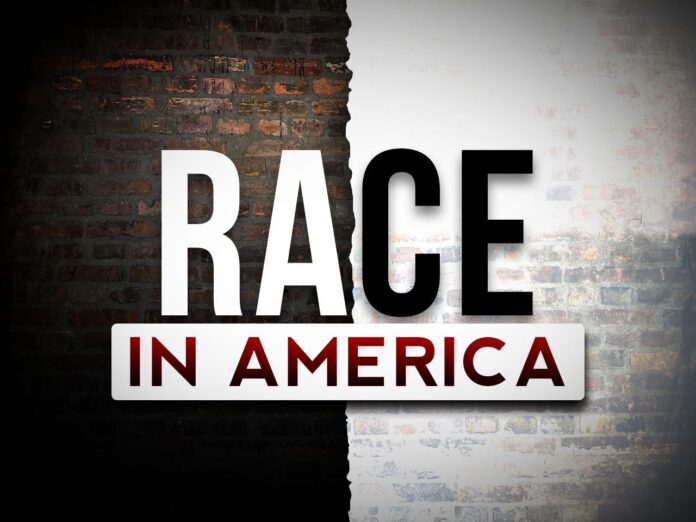Experience with and attitudes toward police
Pluralities of residents of the United States are satisfied with the performance of their local police department (45%) and think they are staffed appropriately (36%), according to a Reconnect Research/Roanoke College Poll.
More respondents report that they or a family member have been helped by police in a dangerous situation (40%) than have been harassed by police (27%). A majority (54%) of those responding think that police are just as likely to use excessive force against Black or white people, while 43 percent think police are more likely to use excessive force against a Black person. The Reconnect Research/Roanoke College Poll interviewed 1,917 residents nationwide between June 18 and June 23.
Fewer than one-in-five (19%) respondents are dissatisfied with how their local police are doing their job, and 19 percent think there are too many police in their neighborhood, but almost twice as many (34%) think there are not enough police.
 African-Americans are twice as likely as whites to report themselves or a family member being harassed by police and more than twice as likely to think that police are more likely to use excessive force against Blacks, and they are less than half as likely as whites to be satisfied with their local police.
African-Americans are twice as likely as whites to report themselves or a family member being harassed by police and more than twice as likely to think that police are more likely to use excessive force against Blacks, and they are less than half as likely as whites to be satisfied with their local police.
Yet, their experience (or a family member) of being helped by police and their view of local police staffing are similar to that of whites. Democrats and Republicans tend to agree on local police staffing, but Democrats are only about half as likely to be satisfied with their local police and more than three times as likely to think that police use force disproportionately against Blacks. They are also twice as likely as Republicans to report harassment by police. Opinions of Independents are closer to those of Democrats than to Republicans.
Race relations
Most residents (69%) agree that racial and ethnic discrimination in the United States is a problem, and 81 percent of those who think it is a problem see it as a big problem. A majority (52%) believes that race relations are worse since Donald Trump became president, while only 18 percent think relations have improved.
 Two-thirds (67%) of respondents think the anger that led to the nationwide protests following the death of George Floyd in Minneapolis was justified. Not surprisingly, less than one-third (28%) think the looting of businesses was at least partially justified. And respondents are more likely to think that President Trump has made the situation worse (48%) rather than better (17%) since the protests started.
Two-thirds (67%) of respondents think the anger that led to the nationwide protests following the death of George Floyd in Minneapolis was justified. Not surprisingly, less than one-third (28%) think the looting of businesses was at least partially justified. And respondents are more likely to think that President Trump has made the situation worse (48%) rather than better (17%) since the protests started.
Regarding race relations, there are large disparities between the opinions of whites and Blacks, and, in most cases, the differences between Republicans and Democrats are even greater. Views among various groups are closest regarding protesters, with a majority of each subgroup seeing the anger as justified but looting as not justified. Both race and partisan disagreement is greatest in questions dealing with President Trump, but it is large in other questions as well, though less than in questions dealing with law enforcement.
President Trump and the nation
Poll respondents were slightly more likely to disapprove (47%) of the job performance of Trump than to approve (44%), but, as is seen throughout this survey, there were large differences between races (53% of whites approve of Trump; 24% of Blacks approve) and parties (80% of Republicans approve compared to only 19% of Democrats). Similarly, Republicans are much more likely than Democrats to think the country is going in the right direction (59% vs. 18%), and the same is true for whites and Blacks (39% vs. 16%). Overall, more than half of those surveyed (60%) think the country is going in the wrong direction.
Analysis
“While a plurality of U.S. residents are satisfied with the performance of their local police, there are large differences when looking at the opinions of partisan and racial subgroups,” said Dr. Harry Wilson, director of Roanoke College’s Institute for Policy and Opinion Research. “Even groups who are unhappy with the performance of their local police tend to think there are not enough police rather than too many.”
“A majority of those polled see race discrimination as a problem (and those who do see it as a big problem) and think the anger felt by protestors was justified while looting was not. Subgroups differences are evident here also, although they are not as great as the differences regarding law enforcement.”
“The partisan and race differences seen here are common in all political polls. While we might say that it seems at times that Blacks and whites live in different countries, it is often the case that Democrats and Republicans inhabit different planets.”

